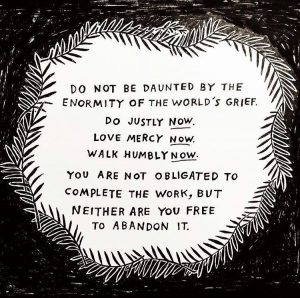 Lenten Journal, Day 26
Lenten Journal, Day 26
This morning on Facebook I saw this sentiment laid out as an inspirational graphic claiming Celtic origins:
Do not be daunted by the enormity of the world’s grief. Do justly, now. Love mercy, now. Walk humbly now. You are not obligated to complete the work, but neither are you free to abandon it.
It is not Celtic. I have also seen it cited to the Talmud. It is not Talmudic. I know this because I have used this epigram in sermons and I have researched its origins. I’ve not been able to find them and, because it is so widely disseminated now with the Talmudic claim, I think they are impossible to find.
Whatever it is, it is a commentary on Micah 6:8.
This morning my eye was caught by the sentence “Do justly, now.” The version of Micah that I am most familiar with, the New Revised Version, translates Micah’s admonition as “Do justice.”
He has told you, O mortal, what is good;
and what does the Lord require of you
but to do justice, and to love kindness,
and to walk humbly with your God?
Other versions, the King James among them, translate the Hebrew as “Do justly” as in this axiom.
He hath shewed thee, O man, what is good; and what doth the Lord require of thee, but to do justly, and to love mercy, and to walk humbly with thy God?
I’m not sure which is a better rendering of the original Hebrew, but it occurs to me that the translators’ choice of noun or adverb makes a significant difference in understanding the prophet’s command.
The modern noun version, “Do justice,” makes justice a task to accomplish, something to be put on our “to do” list. Wash laundry, check. Take out trash, check. Walk the dog, check. Do justice, check. Like other tasks, it can be put off; we can procrastinate about doing justice and not get it done.
The older adverb version, “Do justly,” makes justice a condition of everything we do, something we can’t put off, something about which we cannot procrastinate. Wash laundry justly. Take out trash justly. Walk the dog justly.
I’m not sure how one washes laundry in a just manner, perhaps with nonphosphate detergents or, better, at a “Laundry Love” event paying for and helping the homeless clean their clothes. I’m not sure how one walks the dog with justice, perhaps by respecting for the environment, picking up what one’s dog leaves when doing his or her business or, better, volunteer to walk the dogs at a local no-kill shelter. However these things might be done, though, reading Micah’s admonition as an adverb rather than as a noun, “Do justly,” broadens the scope of the expectation. It’s not a task to be done; it’s a way of doing every task.



Eric, I think the widely-seen quote is from a modern commentary on Pirkei Avot, so the line quoted about not being free to abandon the task is from Talmud. That line is indeed from Avot.
The quote from Micah is added by the commentator.
I believe the commentary is by Rabbi Rami Shapiro in “Wisdom of the Jewish Sages”.
I’ve just ordered a used copy online — I’ll let you know when it arrives and I’ve had a chance to verify my memory.
Breen, you are correct that the quotation is found in the Shapiro book … there is a problem with it in that the reference Shapiro gives, verse 20 of chapter 2 of Avot, doesn’t exist. There is no verse 20 in that chapter. The line about not being free to abandon the task may be Talmudic, but the entire aphorism is not, as often depicted, found in the Talmud.